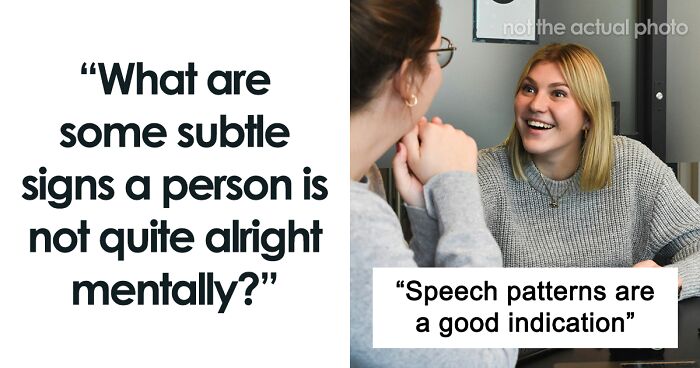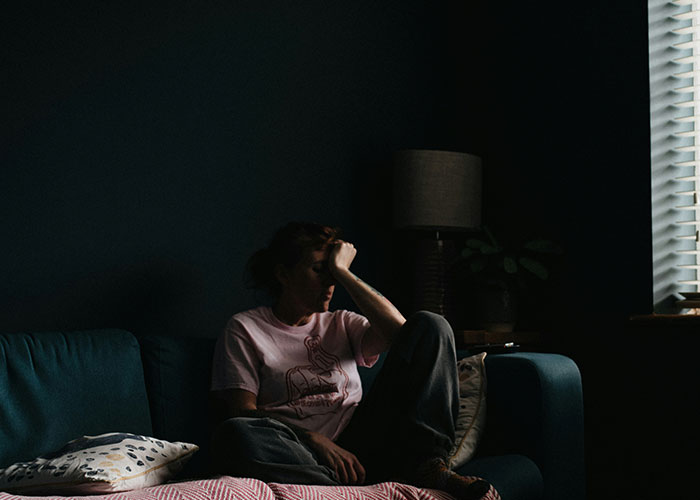
“I Sadly Thought This Was Normal Behavior For A Long Time”: 30 Signs That Somebody Is Not Okay
InterviewMental health is extremely important for our overall well-being. And not just for our own but for our loved ones as well. Wouldn't it be wonderful if we had the superpower to immediately clock the tiniest hints that someone close to us was having problems with their mental health? If we were able to tell when it's just a regular mood swing and when we'd need to actually worry?
Recently, people shared some signs that might indicate a person is having a tough time with their mental health. Some shared the things they wished others noticed about them when they needed help. Others shared experiences with loved ones who have been or are still struggling.
Bored Panda reached out to the Redditor who asked this question, and they were kind enough to have a chat with us. Read our conversation about the importance of mental health below!
This post may include affiliate links.
 What people who aren't depressed or never have been dont realize is just how hard it is getting up in the morning much less making proper appointments for mental health checks. Everything feels exhausting. It's the one disease that literally tries to stop you from getting help for it.
What people who aren't depressed or never have been dont realize is just how hard it is getting up in the morning much less making proper appointments for mental health checks. Everything feels exhausting. It's the one disease that literally tries to stop you from getting help for it.
The Redditor who asked others "What are some subtle signs a person is not quite alright mentally?" got back to us and told us why they decided to post this on r/AskReddit. It appears this topic is near and dear to this Redditor's heart.
The question was inspired by the user's own struggles with mental health, such as depression, anxiety, and alcoholism, as well as the issues of the people in their immediate circle. "I developed an interest in observing these issues and learning about different ways of treating them," the Redditor told us.
 If you know someone who has been really depressed and suddenly they seem very happy it can be a sign that they decided they are going to k*ll themselves and are happy with their decision and glad it will all be over soon.
If you know someone who has been really depressed and suddenly they seem very happy it can be a sign that they decided they are going to k*ll themselves and are happy with their decision and glad it will all be over soon.
 Lives in filth and squalor. Severe depression and other mental illnesses impair your executive functioning and motivation, so tending to basic hygiene and cleanliness is extremely difficult.
Lives in filth and squalor. Severe depression and other mental illnesses impair your executive functioning and motivation, so tending to basic hygiene and cleanliness is extremely difficult.
The user also agrees that it's extremely important to be aware of subtle signs of mental distress. "The sooner one recognizes an issue, the better [the] chance of treating it before it becomes a greater hazard for the person and the ones around them," the Redditor says.
They also have had some personal experience with this and kindly agreed to share it with our readers. "If I myself would have seriously looked at my substance abuse earlier, I would have avoided a bad psychological breakdown and [the] consequences that followed," the Redditor gets brutally honest.
 Personal hygiene is usually for me a sign something ain't alright.
Personal hygiene is usually for me a sign something ain't alright.
InstantMedication:
This is one of the things I started to notice went south before I started to plan to end my life. Just stopped caring if my hair was washed at all. Bipolar and depression are a b**ch.
I had my 6 month dental cleaning yesterday and the hygienist asked if I've been brushing and flossing. I told her I've been brushing as much as I can but flossing fell of my radar due to a really bad bout of depression and this saint of a woman looks at me and says "Listen, that's ok. It's great that you're still brushing because I can't imagine how hard it was to push yourself to do that. I'm proud of you." Let me tell you, I nearly sobbed.
 "The child who is not embraced by the village will burn it down to feel its warmth".
"The child who is not embraced by the village will burn it down to feel its warmth".
This ideation is how incels get started. It's really easy to have a knee-jerk hatred of these men, but reality, as always, is much more nuanced. Men are feeling more and more isolated in society, and when they find other people who are willing to accept them into their circle of course they are tempted. It's so easy to look at things from the outside and make judgements, but loneliness and depression can push people down very dark paths.
 Difficulty to make simple decisions, hyper sensitiveness of any kind of criticism.
Difficulty to make simple decisions, hyper sensitiveness of any kind of criticism.
I don’t think this applies to most people. I have a hard time making a lot of decisions and I’m extremely sensitive and can’t handle criticism but I’m not mentally ill in any way
The Redditor thinks the collective attitudes towards mental health have changed in recent years. They think there's more and more awareness about mental health issues and more compassion towards individuals who have to deal with them.
"I think people are more understanding and appreciative towards mental health than before. The [education] towards recognition and tolerance is better, though there is a huge need for that in schools, especially [for people of] younger ages," the user tells Bored Panda.
 Isolation from other people. Little to no social battery because in their minds they think they are bothersome to people or that other people would not really notice them gone anyway.
Isolation from other people. Little to no social battery because in their minds they think they are bothersome to people or that other people would not really notice them gone anyway.
sl*t4suffering333:
For me, it’s isolation. I haven’t been okay in years so now I work nights and barely interact with anyone. I’ve become so isolated
I don’t even know how to integrate back into society or communicate properly. Appetite is also an indicator. When I stop eating and lose weight rapidly, something is very wrong. I’m usually hoping for death by starvation.
One to be careful with before you judge someone on appearances. Some people are perfectly OK spending a lot of time alone.
 Poor mood regulation, if I ever see an adult have a temper tantrum, I avoid them at all costs.
Poor mood regulation, if I ever see an adult have a temper tantrum, I avoid them at all costs.
he's mad cause he's working on a laptop outside (can't see) no charger (laptop is dead) and no wifi. The guy in this pic has done all this to himself.
A constant sense of boredom, bored at work, bored at home, bored doing hobbies...etc. this is usually a sign of discontent or apathy both of which breed depression.
Well, being bored at work is not unusual (depending on your job) but if you're bored doing hobbies, it'seither time to change hobby, or look for help.
 I have anxiety and I have noticed that when I am asked to do something at work that I am unfamiliar with, I will ask multiple times in multiple different ways. That’s the only way I can receive proper confirmation that I am performing the task correctly. It’s almost as if I have to ask every single step - I’m sure my coworkers hate me for it, but I’d rather ask 100 times than not ask, and have to own up and THEN fix my mistake. For reference, I work in a relatively fast pace environment.
I have anxiety and I have noticed that when I am asked to do something at work that I am unfamiliar with, I will ask multiple times in multiple different ways. That’s the only way I can receive proper confirmation that I am performing the task correctly. It’s almost as if I have to ask every single step - I’m sure my coworkers hate me for it, but I’d rather ask 100 times than not ask, and have to own up and THEN fix my mistake. For reference, I work in a relatively fast pace environment.
 When they adopt a religious mindset that is closer to superstition about *every* single thing in life.
I'm not disparaging all religion, but when a person starts thinking the Archangel Gabriel is walking in their garden when the branches move in the wind or attribute absolutely every single thing, like a napkin falling, to God's plan something is wrong.
When they adopt a religious mindset that is closer to superstition about *every* single thing in life.
I'm not disparaging all religion, but when a person starts thinking the Archangel Gabriel is walking in their garden when the branches move in the wind or attribute absolutely every single thing, like a napkin falling, to God's plan something is wrong.
 A lot of people might say to look out for people who are weird but the real sign is to look out for people who lash out randomly.
A lot of people might say to look out for people who are weird but the real sign is to look out for people who lash out randomly.
I like being weird, weird is all i've got, that and my sweet style - Moss.
 As someone who's been there and seen others suffer, I have some to contribute
-Sudden changes in behavior
-Reckless behavior
-Lack of motivation
-Very high highs and very low lows
-Mood swings
-Changes in appetite (over/undereating).
As someone who's been there and seen others suffer, I have some to contribute
-Sudden changes in behavior
-Reckless behavior
-Lack of motivation
-Very high highs and very low lows
-Mood swings
-Changes in appetite (over/undereating).
 Speech patterns are a good indication. Mania can make people talk really fast or depression can make people not speak at all. How they speak, the words used, can also indicate issues. It's best to just ask if they're ok.
Speech patterns are a good indication. Mania can make people talk really fast or depression can make people not speak at all. How they speak, the words used, can also indicate issues. It's best to just ask if they're ok.
While this is true for most cases, you have to be aware of and consider the person’s “normal” speech patterns so this isn’t a good indicator of mental illness on its own. I have depression and can be noted to never speak/speak only a little often times. But I also happen to have a speech impediment (minor?) which caused me to get bullied at school, resulting in me speaking less and less with time. It’s hard to determine if it’s my speech issues keeping me from being more talkative or if it’s just depression. Also sometimes I happen to experience moments of increased speech, making people wonder if I have bipolar/mania but professionally I’ve never received such a diagnosis. Idk why it happens because my natural is actually a style of forgetting words and being rendered unable to even construct a simple sentence during the few times I talk with anyone. Simply put, just don’t associate particular speech styles with a diagnosis. Sometimes depressed people are the loudest in a room! 😅
 A sense of hopelessness and abusing substances.
A sense of hopelessness and abusing substances.
I do love to smoke a little weed every now and then. Especially when I can’t stop crying. Sometimes a little apathy is all I need to get through the rough patch. Drinking just makes it worse
 I learned that in romantic relationships when someone is very overly affectionate one day and then completely cold the next for no apparent reason, it is a sign they could have a personality disorder. I sadly thought this was normal behavior for a long time.
I learned that in romantic relationships when someone is very overly affectionate one day and then completely cold the next for no apparent reason, it is a sign they could have a personality disorder. I sadly thought this was normal behavior for a long time.
Wait what?!?! I just have social and less social days…right? I just thought it was a part of my ADHD… Edit: I may have misread this. I’m not cold/aloof, just some days I prefer to vibe and not talk and some days I’m really extroverted. I don’t think I have a personality disorder (hopefully?)
 Impulsiveness. It seeps into every crevice of their lives. Whether in relationships, identity, decision making, money. They're literally unsettled mentally. Will drop people just as fast as they bring them in.
Impulsiveness. It seeps into every crevice of their lives. Whether in relationships, identity, decision making, money. They're literally unsettled mentally. Will drop people just as fast as they bring them in.
Incongruence in the emotions on their face and what they are communicating. It gives you the intuitive vibe that something is off and puts your on guard. The classic case is the guy who comes to talk to you in the bar and be really friendly and smooth but their face shows flashes of anger mixed with anxiety and forced smiles that don't appear genuine. This is what we call an incongruent affect.
I was talking to a guy face to face for the first time. he would do overreacting facial expressions that were copying mine. it was so over the top that I realized he's on the spectrum and doing his best to make conversation. like, he had been trained to react from flash cards. I ended up taking that dude to an escape room...he fing loved it. Yeah, figure out which game Egyptian characters on this stone tablet will unlock this dresser.
Lack of motivation.
Not that subtle but a lack of interest in a beloved pet is very concerning. This is a warning sign for one of my family members having a manic episode.
Or a depressive episode. When my mood is VERY low I'm convinced I'm literally poisonous/contaminated mentally and my pets don't deserve to have me spread it, and I don't deserve to experience their comfort, so I withdraw from them. (Their basic needs are still met, obv, better than my own.) It's a very worrying indication.
I work in the mental health sector and have my own mental illness(es). When you say "not quite alright mentally", I am interpreting it as also covering people who are experiencing passive or active s*icidal ideation. You need to have a gentle, private, non-judgemental conversation with them if: - They talk about hurting themselves or others - They often make cryptic remarks like, "Not long left now", "It will all be over soon", "There is no point in being alive", or make flippant jokes about killing themselves - You have noticed a sudden, drastic change in demeanour (ie. they used to seem depressed and withdrawn, but they are suddenly really happy and outgoing and making plans to see people they have not talked to in ages ... This is often a sign that they have created a s*icidal plan & date, so they want to say their final goodbyes) If someone discloses to you that they have been having s*icidal thoughts, take it very seriously. Don't panic. Ask about whether they have made any attempts, are planning to do so, whether they have anything at home that they could use to kill themselves, if anyone else knows, etc. If they live with someone, can that person hide the object they are planning on using to hurt themselves? A couple of pointers: Stay calm. Reassure them that you are there to help, not judge, and that you don't think they are a "bad" person for feeling suicidal. Give them your full undivided attention. Do not leave them on their own. The vast majority of suicides happen when the person is alone. If you can't stay, call one of their friends to come over. Fill in said friend on the situation. Respectfully persuade them to let you take them to the hospital and see a mental health professional. Do not keep the disclosure to yourself. They will need a network of trusted people to keep them out of harm's way. Always let them know that you have to tell a professional. Ask which one of their loved ones should know about what is going on. This should be a trusted adult. Some people's loved ones are dangerous/volatile/unpredictable and cannot be trusted with this info. Tell them about what you are doing; be transparent. There is nothing worse than making a s*icidal person feel powerless. If you suspect that someone is s*icidal but they have not said so, have a conversation with them and, if appropriate, *ask if they have thought about suicide*. Contrary to popular belief, this will not "put ideas in their head" - if they are depressed, chances are they have already thought about s*icidal, however fleetingly. Studies show that people who have been saved from suicide experienced relief and gladness when someone kindly reached out and asked them if they were suicidal. Also, call it what it is - s*icidal, killing yourself, etc. Don't say, "Don't do anything stupid!" Not only is this vague, it will make them feel ashamed and less likely to let you help them. Give *information* (ie. Where they can seek help), not opinions (ie. "s*icidal is cowardly") Hopefully you won't have to use this advice, but if you do, I hope it's handy!
A great deal of advice packed into this response. I once struggled with süicidal thoughts and someone telling me that I was being cowardly or selfish only made it worse. A comforting and understanding listener is far more effective than a judging, overly critical loudmouth.
In terms of depression: I know that my humour gets really dark and goes down the path of jokes about ending my suffering, or s*icide. You'd think that'd be obvious, but in my experience, people only notice it when they're really paying attention. I don't even notice I'm doing it nor do I do it intentionally because they're not funny jokes, but it just takes over. Once it creeps into my language, that's a red flag for me that it's time to get some help. Another one is a lack of enthusiasm about the stuff you know they love. Like if they don't talk about their favourite music for a while. When I'm beginning a depressive episode, the very first warning is that I stop dancing and stop listening to music. I've told my psych, if I stop dancing, I'm in trouble. Now he asks, "when is the last time you danced?" to gauge where I'm at.
I've made jokes about su*c*de in the past until I realized words can change you. Even so I would never do it (unless I got terminal like als). I truly believe I'd be failing myself spiritually and would be sent straight back here to do it over again. No thank you- I'm too curious about my future <3
 I study psychology and everything can be a subtle sign, but some major ones are inconsistent speech, sudden mood swings, physical agitation (constantly shaking your knee for example), delusional ideas (in all ways good or bad ones), loss of interest in almost everything even things that the person loves, etc….
I study psychology and everything can be a subtle sign, but some major ones are inconsistent speech, sudden mood swings, physical agitation (constantly shaking your knee for example), delusional ideas (in all ways good or bad ones), loss of interest in almost everything even things that the person loves, etc….
physical agitation (constantly shaking your knee for example) - i do this all the time. i'm doing it now. i went through a depression a few years ago, and am on medication for that now. my shaking of the leg is probably undiagnosed adhd.
Not always, but slight comments that are insults to their own character, a bit of self-deprecation could be chalked up to acknowledging how you act sometimes, but if it's constant and nearly all the time, then maybe check in on them. If someone checks in on people a lot, they might either be a worrywart, just care a lot about their friends, or perhaps just looking for a bit of help themselves, but want to make sure nobody else needs it, too.
THIS! I had a friend like this, constantly helping teachers with everything and worrying that he was being too bossy/mean as the captain of our sports team, and made self-deprecating jokes and remarks all the time. I always wanted to speak up and be like “don’t be so hard on yourself” but I had a lot more social anxiety at the time lol. I hope he’s doing better now.
My brother is very repetitive. He will ask you something, you’ll answer. The conversation around you will continue and a few minutes later he will ask again, maybe a little different. This will happen again and again, him asking the same question in a different way with long pauses in between, almost as though he’s trying to get you to answer a certain way. Eventually he will just get up and leave the room, dissatisfied. Sometimes he will text me days later, confirming my answer to the question. It’s so f****n weird but harmless. He’s diagnosed Schizophrenic.
 They are constantly changing their groups of friends. They cannot maintain a relationship, whether it's a friendship, family or a partner.
They are constantly changing their groups of friends. They cannot maintain a relationship, whether it's a friendship, family or a partner.
My grandmother is like this, to an extreme. She divorced my grandfather, and would move/still moves all the time. My mom rarely talks to her anymore.
 Lack of flexibility with plans- for me, I would get into an incredibly rigid routine when my ocd or eating disorder were really bad.
Lack of flexibility with plans- for me, I would get into an incredibly rigid routine when my ocd or eating disorder were really bad.
Could also just be autism. Which, I guess, is a mental condition that differs from the norm. But I wouldn’t say it’s a mental issue. It causes issues, sure, but it’s just a brain wired differently.
 You ask them a question, and they respond like a different question was asked, or just come out with a completely unrelated statement. It's almost like someone who wants to change the subject, but it seems like they can't help it, their mind just isn't taking in and processing information correctly.
You ask them a question, and they respond like a different question was asked, or just come out with a completely unrelated statement. It's almost like someone who wants to change the subject, but it seems like they can't help it, their mind just isn't taking in and processing information correctly.
Drama seems to follow them everywhere. (They're the drama).
Ooh I know this one. Avoiding places/situations due to feelings of dread or fear, be it rational or irrational. Abandoning relationships "before they can abandon you" to avoid having to face rejection or criticism. Social isolation. Losing interest in things you once found joyful or fun. Forgetting to shower/keep up with hygiene. Becoming angry or sad in a split second with no apparent reason and not fully understanding why themselves. Giving up. Ive been trying new meds but honestly, with the way this world is going, maybe im *not* crazy. Maybe this is self preservation (minus the forgetting to shower part honestly im distracted af and I need to work on it). Theres so much bad in the world, so much bad happening every day. Im honestly fine with not having friends, less people to disappoint me in the long run. Less people expecting things of me. And im not out here ranting at people in stores or anything, im not causing anyone any trouble. I really just hate this world right now and I dont want to participate until it gets its s**t together.
That’s fair, but also living in fear is kind of a crappy way to live, speaking from someone who once was anxious about any/everything. This sounds a lot like Avoidant or Borderline Personality Disorder…
Ever talk to someone for a while, like know the guy for months, and realize one day you don't really know anything about them? Can't recall them ever mentioning a family member or even a favorite color. Maybe you went out to eat a few times and they always insisted you pick the restaurant. Like they're scared to let you know anything about them. They're perfectly friendly, get you to talk about yourself, listen to you ramble about your hyper fixations, but when you try to talk to them about them they suddenly don't have anything to say. I've met a few people like this and most of the time I never figure out what's up, but a few times I've gotten them to open up about being bullied or emotionally abused as a kid.
Very High highs and very low lows... my sister was clubbing in clubspace for 9 hours before she took her life the next day.... Smoked 4 carts of THC, wrote an odd s*icide note, went on a "juice clense" 4 days before. :/.
Thinking they have more control over others than themselves. Overly angry. Looking for any little mistake from the world around them to justify their anger. Inability to apologize.
I used to work answering phones relating to legal issues and a big sign was always pressured speech. They’ll talk and talk and it only halfway makes sense. But typically people wanted to hear some reassurance or information and these people would not stop talking no matter what I said. And usually their legal issue was outlandish to say the very least.
Grandiose narcissism, probably due to social media pumping up their heads. Sadly it's made its way into the workplace; and those on social media have taken it into real life.
Inability to laugh at themselves. Selecting exclusively for short term self interested gains. S**t talking previous relationships. Always having an excuse.
Sitting down in the shower. Seems very small but not even having enough energy or being uncomfortable while simply keeping yourself up during a routine thing in life is a pretty good sign somebody is in the very least, burnt out or mentally ill.
They keep apologising.
This is also a response to abuse. I have come out of an abusive relationship and I apologize profusely even at times to inanimate objects (bang my knee on a table an apologize to the air) Now in any situation where I fear conflict I apologize to try to avoid getting yelled at
I always know my cousin is off her meds when her Facebook is in overdrive. Countless status updates, commenting on old photos, sharing old photos etc.
I know a few people who are in recovery for addiction and I’ve noticed when they seem to always be online but rarely post anything something is wrong.
They lie a lot.
For me it’s pressed/rushed speech and an insistence on interrupting .
I had a friend who did this. Always thought it was just the ADHD but idk maybe smthn else was going on.
If every single problem in their life leads back to someone else. All their ex's are "toxic". Their coworkers, friends, family... ect are causing drama/problems. Yet you never hear how they personally screwed up.
Not all my problems but 90% of my issues is because of my dad. Childhood trauma is a female dog
Speak excessively in hyperbole and slogans. Some people will use pseudo spiritual buzzwords like "enlightened" and use phrases like "the heart wants what it wants", etc. If you listen closely, you'll hear that they don't really say anything, it's just a jumbled mess that sounds deep and profound on the surface.
Seriously, the focus on the heart is so stupid. It's the only internal organ that you can detect the status of operativity with bare eyes and hands. A liver, for example, is a lot more complex, but as it acts as a chemical reactor, you can't just feel it working with a hand on somebody's belly. This stretches into dumb and unjustified laws, such as the heartbeat bill, which for no rationally justifiable reason makes a stupid membrane pump the deciding factor on what is considered a life human and a bunch of cells and preorgans. The heart ... am Arsch!
Handwriting clues- my favorite being a random mix of upper case and lower case letters. I’m not talking about penmanship, but there can be clues there, too.
Anything out of character for them. For someone could mean them withdrawing from friend groups and social situations when they're normally the centre of attention. For someone else it could be taking more risks than normal and suddenly they are the centre of attention. Then you have the general things, limited/no eye contact, not sleeping or sleeping too much, not eating or eating too much, being agitated, loosing their temper quickly and being overly emotional and sensitive, talking about death and self harm, fixating on specific things to the point it impacts their life negatively and disassociating from life in general. The other thing people need to remember is that what often happens is you will see someone snap out of a depressed mood quickly and be fine so people stop worrying about the person. But later the person unalive themselves, this is because the person had made a plan and they had given themselves an escape route. I highly recommend doing a mental health first aid course if you are interested in being able to recognise the signs that someone is mentally unwell.
When they get personally offended at your objective boundaries, or when they try to say negative things to themselves about you just in earshot so you can hear. With the wrong person, this could be everyday for years. It seems to indicate lack of ability to self regulate or ask for what they need directly + possible unhealthy codependency on their part.
Telling the same stories over and over. Being quick to anger and easily triggered if they hear something they disagree with. Lying all the time and lying over mundane things that have no real consequences. People who like to be in control all the time.
Posting a lot of "motivational" quotes on social media. Things about not engaging with toxic people etc.
My brother started to post more on social media. It was the start of a really long manic phase and kind of kicked off the first clue that he had something going on. He had struggled with anxiety and depression before but this was different. We also suspect CTE is partly to blame, but he’s definitely bipolar, not sure of his treatment. It’s been almost three years since we’ve spoken. Best for everyone.
Inability to just let things slide. A friend of mine just has to have the last word on everything - relationships/friendships have to end on her terms. I love her dearly but it's exhausting being her friend at times.
One of the biggest signs that i've taken note of throughout my life experiences is-- usually someone that is happy to take as much as they can from other people, whether it be time / energy / resources / support / money ect., but will absolutely be the ***last*** person to ever reciprocate or offer when a said person they've done this to may have any type of need. anyone that can be that level of greedy, inconsiderate, emotionless, disingenuous ... is a huge signal for me that they mentally not quite straight & do not align as someone that i would want to associate with.
Always some kind of project or self improvement thing going.
Lying, fixation that the ends that justify the means, assuming you know what someone else thinks and choosing* on their behalf * choosing for other people: “I know he likes turkey so I’ll order him a turkey sandwich” = normal and considerate “She won’t want to come, so let’s just not invite her” = removing agency from others.
If they act “autistic”: like always wanting everything to be clean and tidy.. a former coworker of mine always was a bit weird. I thought he had autism because he was way older than me, working a job in my area pretty much only teens would work. He was there full time. This season I learned that he got fired for posting about our boss on Facebook and YouTube. He was firmly convinced, that our boss was an alien and shared that with everyone.
1. Threatens self-harm as a way to get things from you. 2. Off-hand insults. 3. Tells you others bend the rules for them, that you're the only one enforcing them. 4. Completely bonkers interpretation of what others say or do, almost always in a negative light. 5. They tell you they're a target of gangstalking/that gangstalking is real.
Laughs at stuff that isn’t funny and is quite insensitive.
Friend would say insensitive things. When I finally confronted him(very difficult for me because I hate confrontations) he explained he was just busting on me. He was a compassionate person who would never do anything mean. I told him it still bothered me and I would like him to stop. He just continued the insensitive remarks because it was my fault for taking them the wrong way. If you are really making a joke, shouldn't both people think it's funny. I realized he was an insecure passive-aggressive who enjoyed manipulation because it was the only thing in life he did well.
This reminded me of an experience I had a couple months ago. It was supposed to be my "one last good day". My German teacher noticed this and when he saw me near the balcony ledge, he didn't call me out, he just moved between me and the balcony and attempted to make small talk with me until the bell rang and I had to go to class. I don't know how to begin describing the amount of gratitude I have for this man.
A large majority of these described Generation X. It's how we were raised. DO NOT BOTHER peope and your presence is a bother, we were raised to rarely been seen and never heard and just being in the house bothered parents and grandparents. The same descriptions can be used with someone who is disabled and living in chronic pain. Seriously one needs to look at the situations the person is living in before going all out on "You need mental help"
I would like to add something from my own personal experience. If someone has had a brain injury, be it a concussion or aneurysm keep an eye on their personality for changes. My uncle was in a wreck and ended up with a brain injury and within 6 months he took his own life.
This reminded me of an experience I had a couple months ago. It was supposed to be my "one last good day". My German teacher noticed this and when he saw me near the balcony ledge, he didn't call me out, he just moved between me and the balcony and attempted to make small talk with me until the bell rang and I had to go to class. I don't know how to begin describing the amount of gratitude I have for this man.
A large majority of these described Generation X. It's how we were raised. DO NOT BOTHER peope and your presence is a bother, we were raised to rarely been seen and never heard and just being in the house bothered parents and grandparents. The same descriptions can be used with someone who is disabled and living in chronic pain. Seriously one needs to look at the situations the person is living in before going all out on "You need mental help"
I would like to add something from my own personal experience. If someone has had a brain injury, be it a concussion or aneurysm keep an eye on their personality for changes. My uncle was in a wreck and ended up with a brain injury and within 6 months he took his own life.

 Dark Mode
Dark Mode 

 No fees, cancel anytime
No fees, cancel anytime 

















































































